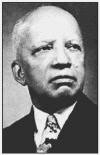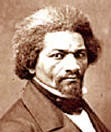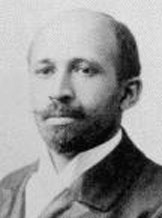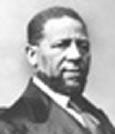Black History Month
Black History Monthan interview with Curtis May |
||
| The Odyssey staff interviewed Curtis May, director of the Office of Reconciliation Ministries, an outreach ministry of the Worldwide Church of God, about Black History Month.
From left: John McKenna, Mike Feazell, Paul Kroll, |
||
Question: What is Black History Month?Curtis May: Black History Month began in 1926 as Negro History Week. It was established by Carter G. Woodson as a way to bring attention to the positive contributions of black people in American history. In 1976 Negro History Week became Black History Month. |
||
Q. Who was Carter G. Woodson?A. Dr. Woodson was a son of former slaves. He worked in the coal mines in Kentucky to put himself through high school. He graduated from Berea College in Kentucky in 1903, and then went on to Harvard for his Ph.D. It bothered him to find that blacks had hardly been written about in American history books, even though blacks had been part of American history from as far back as colonial times. And when blacks were mentioned, it was not in ways that reflected the positive contributions that they had made. So he wanted to do something about that. In 1915, he established the Association for the Study of Negro Life and History (now called the Association for the Study of Afro-American Life and History) and then founded the Journal of Negro History and Negro History Bulletin. Then in 1926 he started promoting the second week of February as Negro History Week. |
 |
|
Q. Why February?A. Woodson chose February because the birthdays of Abraham Lincoln (right) and abolitionist Frederick Douglass (far right) were in that month. These were two men who had a great influence on black Americans. In addition, several other important events took place in February. For example, the 15th Amendment, which said that the right to vote could not be denied on account of race, was ratified on Feb. 3, 1870. W.E.B. DuBois (right), educator and writer, was born in February 1868. The first black U.S. senator, Hiram Revels (far right), took his oath of office in February 1870. The founding of the NAACP in 1909 took place in February, as did the murder of Malcolm X in 1965, and the Greensboro, North Carolina, sit-in at the Woolworth’s lunch counter in 1960. |
 |
 |
 |
 |
|
Q. Why is Black History Month important today?A. All young people need positive role models to inspire them and spur them on and to help them know that they, too, have the potential to achieve their dreams and accomplish worthwhile and important things. Young blacks need to know about the many positive achievements of black men and women throughout history in every field of endeavor. Knowing what others have done inspires confidence in young people to know that they can do worthwhile things too. Knowing about the achievements of black doctors, scientists, lawyers, economists and journalists provides encouragement and incentive to black young people to strive for excellence themselves. Without such knowledge and encouragement, young people can end up wasting precious time and energy blaming the system and feeling victimized. |
||
Q. How would you describe the value of Black History Month for nonblacks?A. Black history is not merely black history, it is American history. By better understanding the positive contributions of another ethnic group, all Americans benefit. When we understand one another better, we are that much closer to having positive relationships with one another. Many nonblacks, even many blacks, have erroneous stereotypes in their minds about blacks and their history in the United States. These negative ideas and impressions create barriers to good relationships and to the true potential that all Americans have for working together toward our common goals for freedom, peace and achievement. Black History Month provides a focus on the positive history, achievements and contributions to American ideals that blacks have made throughout history. And that helps to dispel the negative ideas and stereotypes that invariably spring up when the truth is not given the light of day. The experience of black Americans in our history can be a further inspiration to all Americans that no matter how tough the struggle, no matter what the odds, when we don’t give up, when we stand together firmly for the right and the truth, great things can happen. And there’s nothing more truly American than that. It’s our collective legacy and heritage. |
||
Q. How can Christians benefit from Black History Month?A. The civil rights movement was born in Christian faith and values. The early leaders of the movement were Christian ministers, black and white alike, who saw injustice and worked in nonviolent ways to bring the love of Jesus Christ to bear on a system that reflected neither the gospel itself nor the deepest values of the U.S. Constitution. As Christians, when we rehearse that struggle and celebrate the positive achievements of Americans who excelled despite having been socially marginalized, we affirm the values and responsibilities of our faith. |
||
Q. Can you give me one word that in your mind characterizes Black History Month?A. Well, I think I’d have to say hope. It’s all about promoting hope—hope for a better tomorrow that springs from the lessons, the tears and the joys of what has gone before. It’s a hope that grows from understanding and from truth—and from the power of love. And I thank Jesus Christ, because he takes all our meager efforts and turns them into a real and true hope that sees past all the challenges of the present and into a future where his love binds all people together, all people of all backgrounds and races and histories all bound together as one in him. |
||
Church History Corner
The Life and Times of Martin Luther King Jr.
1929-1968
It’s fitting during Black History Month in February that we remember the work and vision of Martin Luther King Jr., a major leader of the civil rights movement beginning in the mid1950s. Americans celebrate his birthday as a national holiday each January, recalling the struggle to end racism and bigotry in America. King was an eloquent Baptist minister who advocated and participated in nonviolent means to achieve civil right for blacks and equality for all.
King received a bachelor of divinity degree from Crozier Theological Seminary in 1951 and earned a doctor of philosophy degree from Boston University in 1955. He came from a long line of Baptist ministers. His father was pastor of Atlanta’s Ebenezer Baptist Church, and in 1960, King moved to the city to pastor his father’s congregation. King was chosen as the first president of the Southern Christian Leadership Conference in 1957.
In 1963, he was jailed in Birmingham, Alabama, after a nonviolent protest that led to a confrontation with Public Safety Commissioner “Bull” Connor and municipal authorities. While in jail, King was criticized by a group of white clergymen who blamed him for inciting the violence and who voiced concerns about his civil rights strategy. It was then that he penned his “Letter From a Birmingham Jail.”
King ended his letter with these words: “I hope this letter finds you strong in the faith. I also hope that circumstances will soon make it possible for me to meet each of you, not as an integrationist or a civil rights leader but as a fellow clergyman and a Christian brother. Let us all hope that the dark clouds of racial prejudice will soon pass away and the deep fog of misunderstanding will be lifted from our fear-drenched communities, and in some not too distant tomorrow the radiant stars of love and brotherhood will shine over our great nation with all their scintillating beauty.”
Then in August 1963 came King’s most soaring and hopeful civil rights rally on the steps of the Lincoln Memorial in Washington, D.C. Here he delivered his rallying “I Have a Dream” speech.”
For his work to end segregation and discrimination, King was awarded the Nobel Peace Prize in 1964. King was only 35 years old when he accepted the prize in December of that year on behalf of all who participated in the Civil Rights Movement, making him the youngest recipient of the award in history.
But the seeds of human hatred and bitterness cut short King’s life less than four years later. On April 4, 1968, while standing on the balcony of the Lorraine Motel in Memphis, Tennessee, he was shot to death by James Earl Ray. King was only 39 years old. Though he never wavered from his position and practice that nonviolence must remain the approach of the civil rights movement, he died a martyr’s death from an assassin’s bullet.

